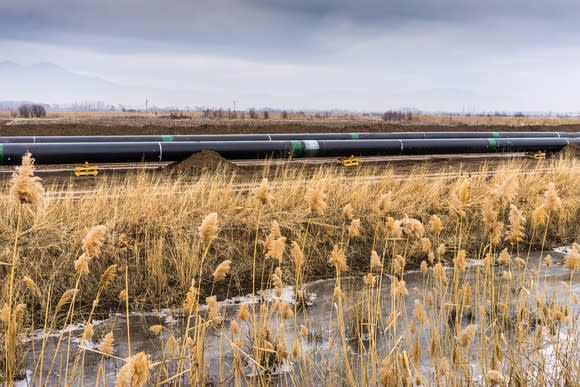You Won’t Want to Miss the Dramatic Change in This High-Yield Dividend Stock
Targa Resources (NYSE: TRGP) currently offers a well-above-average dividend that yields 6.6%. In exchange for that high yield, investors need to accept a higher level of risk since the company barely generates enough cash flow to cover that payout, which is one of several red flags.
However, the pipeline and processing company is currently constructing several needle-moving expansion projects, which should put its payout on a much firmer foundation. Because of that, risk-tolerant investors could reap big rewards in the coming years if the company's strategy works as well as it hopes.
Image source: Getty Images.
A cause for concern
Last year, Targa Resources generated $851.8 million in distributable cash flow, which is money it can pay out in dividends. The company would go on to send virtually all that cash to investors, leaving it with a razor-thin dividend coverage ratio. That's a concern, because Targa Resources' cash flow is more volatile than that of most of its peers since long-term, fee-based contracts only back about two-thirds of its earnings, with the other third having direct exposure to commodity price volatility. For comparison's sake, most rivals like to get more than 85% of their earnings from stable sources like fee-based contracts. Targa's higher exposure to commodity prices increases the risk that it could pay out more than what comes in if volatility returns to the market.
If that were to happen, the company would either have to borrow money so that it could maintain its high-yield dividend or reduce it to a more sustainable level. Adding debt isn't an ideal option since Targa Resources has junk-rated credit -- which means it's more expensive for the company to borrow money -- and it's not a sustainable practice over the long term. Further, the company already needs to access outside funding for its growing slate of expansion projects. Those factors increase the risk that Targa might need to cut its dividend if market conditions deteriorate.

Image source: Getty Images.
Growing its way out of trouble
While Targa's financial metrics are a concern right now, they are beginning to head in the right direction. For starters, the company expects its earnings to rise 12% in 2018 due to higher commodity prices -- which are above its initial outlook -- and the impact from recently completed expansion projects. Because of that, the company should have some more breathing room on its payout this year.
Meanwhile, Targa Resources is investing several billion dollars in a variety of growth projects across its footprint. More importantly, long-term, fee-based contracts underpin the bulk of these expansions. That means its cash flow will not only increase but will grow more predictable.
One of the company's largest projects is the Grand Prix Pipeline, which will move natural gas liquids (NGLs) from the Permian Basin and STACK Shale Play of Oklahoma toward the Gulf Coast. Targa and its partners will invest $1.65 billion in the project, which should start up by the second quarter of next year. Meanwhile, the company is a partner on two large-scale natural gas pipeline projects. The first is the Gulf Coast Express pipeline under development by Kinder Morgan (NYSE: KMI). The $1.75 billion pipeline should start up by the end of 2019 and generate steady cash flow for several years since Kinder Morgan locked up long-term contracts for the pipeline's entire capacity.
Targa Resources also signed a letter of intent with MPLX (NYSE: MPLX), NextEra Energy, and a privately held midstream company to develop the Whistler Pipeline. While the partners hope that this project will enter service by the end of 2020, they've only secured shippers for three-quarters of the pipeline's capacity. Because of that, they might have trouble hitting that projected in-service date since the project seems to have fallen behind Kinder Morgan's second gas pipeline, the Permian Highway Pipeline, which recently secured enough shippers to move forward. However, with Permian gas output on pace to double in the next decade, Targa should eventually fill this pipeline's capacity.
Not only has Targa Resources secured several promising growth projects that will provide it with more stable cash flows, but it has creatively locked up funding. For example, the company teamed up with two private equity funds to help finance 45% of the cost to build the first phase of the Grand Prix pipeline. Targa also secured a funding partner for a portion of its 25% share of the Gulf Coast Express and expanded its joint venture with MPLX to develop a natural gas processing plant in Oklahoma. These deals have helped reduce the company's equity funding needs for 2018 from more than $1 billion to a much more manageable level of less than $500 million.
On its way toward becoming a much more appealing option for income seekers
Targa Resources' current financial metrics put its high-yield dividend at risk of a reduction if energy market conditions deteriorate. However, with oil prices on the upswing and several needle-moving expansion projects underway, those numbers should improve over the next two years. As they do, Targa Resources will become an increasingly compelling option for dividend investors to consider buying.
More From The Motley Fool
Matthew DiLallo owns shares of Kinder Morgan. The Motley Fool owns shares of and recommends Kinder Morgan. The Motley Fool has a disclosure policy.

 Yahoo Finance
Yahoo Finance 